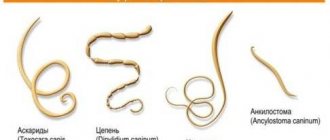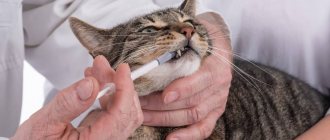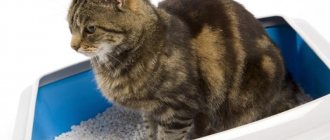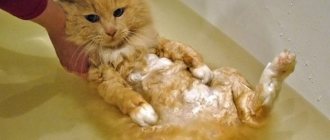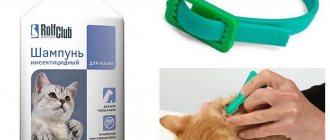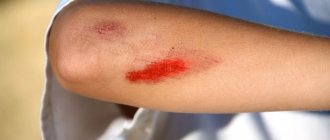Why worm a cat?
Pets often suffer from worms. Parasites that have settled inside the body harm the health of the animal and can be deadly. The most common parasites diagnosed in cats are:
- a tapeworm that grows in a pet's intestines. The length of the parasite reaches 45-50 cm. With the help of suction cups and hooks, adult individuals are attached to the intestinal mucosa. Against this background, an inflammatory process develops;
- A flatworm that parasitizes the internal organs of a cat and causes severe damage and distress. When a cat is infected with flatworms, the animal suffers from fever, vomiting, severe weakness, hair loss and problems with the digestive system;
- a roundworm that lives in the small intestine. Against the background of helminth infection, the cat suffers from exhaustion, systematic vomiting, and disturbances in the functioning of the digestive system.
For your information! It is very important to worm your pets to keep them healthy. In addition, it is worth considering that tapeworms and roundworms can be transmitted to people. Small children often suffer from helminthic infestations.
Anthelmintics
Before vaccination, the animal must be wormed.
Diarrhea in a cat after deworming
People often hear that antiparasitic drugs are the cause of diarrhea in cats, poisoning and other ailments, including death. Naturally, every drug is toxic to some extent, but the main problems arise not because of the chemical component of the product, but because of an erroneous dosage or an incorrectly selected product. Regarding diarrhea in a cat after deworming, this is a completely different story. Typically, diarrhea is caused not by drugs, but by dead, decaying parasites. And for a cat, diarrhea in this case is a natural way to cleanse the intestines of dead worms.
You can also contact our site's staff veterinarian, who will respond to them as soon as possible in the comment box below.
Home deworming regimens
How to deworm a cat at home? When choosing a drug, it is important to consider the spectrum of action. Despite the universality of most medications, there is a category of drugs that are active against nematodes and cestodes.
How to train a cat to use the toilet: instructions at home
It is also important to take into account which animal needs to be dewormed. For aggressive cats, it is advisable to use drops on the withers; for calm pets, you can choose any medication option. When calculating the dosage, the weight of the animal and the individual characteristics of the body are taken into account. If hypersensitivity to one of the components of the product is detected during processing, you should immediately seek help from a veterinarian. It is advisable to alternate the drugs used for prophylactic purposes.
Note! To minimize the risk of infection with worms, it is necessary to systematically clean the cat's litter box and replace the litter. The tray itself is rinsed with boiling water. Raw meat and fish should be excluded from the diet.
How many days to worm and how often
The anthelmintic drug is given to the animal in the morning for 60-90 minutes. before meals. You can start deworming your pet from the age of one month. How often to worm a cat? The procedure is carried out every 3 months for preventive purposes. If the furry purr is free-ranging, anthelmintic medications must be given every 4 weeks.
Putting a cat to sleep: options at home and without a veterinarian
When performing routine preventive or therapeutic deworming, it is important to take into account the peculiarities of this procedure. Veterinary experts recommend giving the medicine in two stages. After the first treatment, repeated treatment is carried out 10 days later.
Important! Before giving the drug to an animal, you must carefully read the instructions and strictly follow the dosage indicated by the manufacturer.
Worm infestation is very dangerous
When is it necessary to deworm cats?
Worm eggs have high viability, thanks to which they survive in almost any conditions. They can be found in the soil and grass of city squares, in the dust of asphalt roads, in the entrances and apartments of residential buildings. They are carried with shoes, clothing, human skin and animal fur. Given the widespread distribution of parasites, it is considered necessary to carry out routine deworming of cats 2-4 times a year. It is considered mandatory to remove worms in the autumn and spring, when their concentration in nature is increased.
It is necessary to carry out the procedure before vaccinating the animal. This will help your pet better tolerate the vaccination and avoid side effects. Since infecting a cat with worms can be dangerous during pregnancy, anthelmintics should be given to animals that are being prepared for mating. The procedure is carried out for both animals 2 weeks before mating, and also separately for a cat that has already given birth 3 weeks after birth.
If you plan to carry out surgery, then this is also the case when deworming is needed. It is carried out 2-4 weeks before surgery.
A cat that has not received antiparasitic drugs for a long time should not receive a single large dose of the active substance. Mass death of helminths is accompanied by the release of a large amount of toxic substances into the blood, which can be difficult for animals to tolerate. The drug is given to the cat strictly according to the instructions. Under no circumstances should animals be given anthelmintics intended for humans.
Main types of helminths in cats
Several types of anthelmintic drugs are commercially available:
- against a specific type of worm;
- complex type with a wide spectrum of action.
How to remove fleas from a cat at home
You can purchase drugs in the form of:
- solutions for injections;
- drops;
- suspensions;
- tablets.
How to deworm a cat? It is necessary to choose the right medication, taking into account:
- individual characteristics of the body;
- pet's character;
- age category of the pet;
- the presence of children in the house who are in contact with the cat.
Note! Only healthy animals can be dewormed. Before giving your cat a pill, it is important to read the instructions and pay special attention to the sections on contraindications and side effects of the medication.
Methods
Every owner should know how to properly deworm cats with different drugs. Some animals calmly eat food to which the medicine has been added. But if you can’t feed the cat this way, then there are other methods.
A calm animal should be seated nearby, its mouth should be carefully opened and the tablet should quickly be placed far away on the tongue. After this, the mouth is closed and, lightly stroking the pet’s neck, they force it to swallow the medicine.
But if the cat behaves restlessly, then the tablet must be crushed and diluted with water. The resulting suspension is drawn into a small syringe without a needle. The animal is wrapped tightly in a towel, its mouth is opened and the drug is injected into the cheek. The cat is released only after it has swallowed everything.
It is convenient to deworm an animal using drops. They are applied to the withers so that the cat cannot reach them with his tongue.
A veterinary clinic can give you an anti-worm injection.
The best drugs for home use
Below are the most effective anthelmintic drugs that veterinarians use to prevent and treat helminthic infestations.
- Drontal is a medicine with a narrow spectrum of action. If the animal suffers from parasites, it is better to give preference to another remedy. Drontal is ideal for a preventive procedure.
- Dirofen - tablets with a wide spectrum of action. This universal remedy effectively copes with the task of getting rid of worms. It is unacceptable to give tablets to kittens less than 6 weeks old.
- Profender is not suitable for deworming kittens and pregnant cats. Drops must be applied to the withers area. An effective remedy belongs to the category of gentle medications. When calculating the dosage for application, it is important to take into account the weight of the pet.
- Kanikquantel is a remedy that is often used to treat pregnant cats and small animals that are barely 3 weeks old. It is better to ask a veterinarian how to deworm a kitten. During therapy or prevention, no special dietary intake is required.
- Febtal is a one-time use drug. Experts recommend placing the tablet on the root of the tongue. To calculate the dosage of treatment for an adult cat, one should proceed from the manufacturer’s recommendations (1 tablet is required for every 1.5 kg of weight). Kittens should be given 1 tablet per day for 3 days.
- Alben-S is intended for single use. For an animal whose weight reaches 5 kg, 1 tablet is enough. It is advisable to give the medication in the morning, mixing it with pate. You can also crush the tablet, mix it with 2 ml of water and inject it into the cat’s mouth using a syringe (without a needle!). There is no need to follow any dietary requirements on the eve.
- Prazitel is an effective broad-spectrum remedy that can cope with both round and tapeworms. The dosage of the suspension is calculated based on the recommendations of specialists: for each kg of weight you will need 1 ml.
- Dironet is a medicine that contains praziquantel and pyrantel pamoate. Dironet has a wide spectrum of action and high efficiency. Dironet can be used after castration and sterilization.
Choice of medications
How and with what to worm a cat
The good news for all cat owners is that in mild or moderate stages, helminthic infestations can be treated with special antiparasitic drugs. In addition, to prevent infections and the unpleasant consequences that they can entail, pets need to be regularly wormed for preventive purposes.
Cats need to be wormed several times a year.
When to worm a cat for prevention?
The process, which is popularly called anthelmintic, is called deworming in medicine. It must be carried out regularly, since cats are more susceptible to infection with helminths than people - they constantly lick themselves, eat raw fish and meat, and sometimes do not disdain birds and rodents, which are often carriers of dangerous parasites.
Cats need to be wormed or dewormed after reaching the age of one month. If the animal does not leave the house, it is enough to carry out the procedure 3-4 times a year, and for pets that roam freely on the street, it is necessary to increase the frequency of deworming to once a month. Sick animals must be given antiparasitic drugs immediately, in compliance with certain rules and instructions for the medicine.
If your cat has fleas, deworming may not be effective.
Medicines for worms destroy only adult individuals, but are not able to affect the eggs of parasites, so after about 10 days a new generation of helminths grows, which also needs to be destroyed. For serious helminthic infestations, as well as infections in kittens, elderly or weakened animals, treatment should be carried out after consultation with a veterinarian.
Advice! Along with regular preventive deworming, cats need to undergo flea control procedures - these parasites often carry helminth eggs.
Why worm a cat before vaccination and sterilization?
Vaccination is another mandatory medical measure that protects pets from dangerous and often fatal diseases. It is performed after certain preparation, which includes taking anthelmintic drugs, and deworming is recommended even in cases where the cat has no symptoms of parasite infection. The fact is that vaccinations can only be given to healthy animals, and helminthic infestation is a fairly serious disease and a contraindication to vaccination. You can find out about the timing of deworming and recommended medications from your veterinarian, but usually anti-helminth medications are given to the cat no earlier than a month and no later than 10 days before vaccination.
Sterilization (castration), like any other surgical intervention, reduces the animal’s immunity, and if it is weakened by the activity of parasites, the risk of postoperative complications increases significantly. Accordingly, deworming is necessary for cats both before vaccination and before sterilization. The exception is animals that have been dewormed no earlier than 1.5 months before the procedure.
You can read more about how to prepare a cat for castration on our portal.
Worming is necessary before vaccination and sterilization
How to worm a pregnant or lactating cat
Pregnancy and lactation in cats are contraindications to taking anti-worming drugs, so in cases where the animal does not suffer from manifestations of helminthic infestation (is active, eats normally, does not lose weight, etc.), then it is better to hold off on deworming. If the pet feels unwell, the deworming procedure should be carried out as soon as possible. When carrying out the procedure, do not forget that almost all drugs against helminths have a toxic and teratogenic effect, that is, they can cause miscarriage or congenital deformities in kittens.
Pregnant and lactating cats can only be wormed if prescribed by a doctor.
Products that are approved for pregnant and lactating cats include Drontal, Dirofen and Profender.
- "Drontal" and "Dirofen" can be used in the second half of pregnancy, but not earlier than 6 weeks after mating.
- Profender is approved for use throughout pregnancy, with the exception of the last three weeks.
It is strictly not recommended to choose medications for the treatment of pregnant and lactating cats on your own - the procedure can be carried out after prior approval from a veterinarian.
Carefully! The eggs of some parasites are able to penetrate the placental barrier and into breast milk, causing serious harm to developing offspring, so it is better to worm the cat before mating.
The best drugs for treating worms in cats
Veterinary pharmacies offer cat lovers and breeders a large number of different medications for worms, each of which has a specific effect on parasites:
- influence the nervous system of helminths;
- destroy the outer shell of parasites;
- make physical activity difficult;
- slow down metabolic processes in the body of worms.
To deworm cats, it is important to choose the right drug
In addition, each of the drugs is effective against a certain type of parasite and has its own pros, cons and application features that should be taken into account when choosing a drug.
Table 2. The most popular anthelmintic drugs for cats.
| Drug name | Release form | Features of the impact |
| "Prasitel" | Suspension, tablets | A relatively safe drug with a wide spectrum of action, which is most often used against cestodes and nematodes. Suitable for deworming kittens, pregnant and lactating cats (not earlier than 22 after lambing). The disadvantage is low efficiency, so for deworming street cats you need to choose a different drug |
| "Dirofen" | Tablets, suspension, paste | A complex remedy effective against tapeworms and roundworms with a quick effect. It has a small number of contraindications, the main of which is the age of the kitten up to 1.5 months |
| "Profender" | Drops on the withers | It has a gentle effect and destroys almost all types of parasites that are most often found in cats. The main advantage is ease of use, the disadvantage is quite high cost. |
| "Poliverkan" | Soluble cubes | A broad-spectrum anthelmintic drug (usually used for infestations by cestodes and nematodes), approved for use in kittens that have reached the age of one month, but prohibited for pregnant individuals |
| "Drontal" | Pills | Effective against tapeworms and roundworms, can be used for both therapeutic and prophylactic purposes. Practically does not cause adverse reactions, can be used to treat helminthic infestations in pregnant, weakened and small animals |
| "Prasicide Plus" | Suspension, tablets | Recommended for the control of nematodes and flatworms. The product is quite strong, so it is taken once and in some cases can cause side effects |
| "Kanikvatel plus" | Pills | Has a quick and effective effect against round and tapeworms. One of the most gentle antiparasitic agents, approved for use in kittens over three weeks of age |
| "Albendazole Ultra" | Tablets, powder | The drug is recommended for use in case of infection with liver flukes, but requires precise dosage selection, since in case of overdose it can have a detrimental effect on liver cells |
| "Pirantel" | Suspension, tablets | It has a good effect against tapeworms and hookworms; it is not used in pregnant and lactating animals. Disadvantage - side effects, which include vomiting, diarrhea, lack of appetite |
| "Piperazine" | Tablets, powder | Used to treat helminthic infestations caused by roundworms or hookworms; it has no effect on tapeworms and flukes. It has an effective effect and is quickly eliminated from the body, but in some cases |
It is recommended to purchase anthelmintic drugs for cats only in pharmacies (regular or veterinary), since there are many counterfeit products on the drug market. At best, such medications will not give the desired effect, and at worst, they will cause serious complications.
Anti-worm medications are available in different forms (including in the form of drops on the withers)
Advice! Since many drugs for worms have a fairly narrow spectrum of action (they destroy only certain types of parasites), before treatment you should do an analysis that will allow you to determine the type of infestation, or use universal remedies.
Folk remedies for use at home
How to deworm a cat at home other than tablets and suspensions? Some owners of furry purrs prefer folk remedies. The most effective of them are presented below.
- Sugar solution. If the cat does not want to drink this water, you can use a syringe (without a needle!) to pour the product into the pet’s mouth.
- A decoction of fennel or chamomile is given to the cat daily at the beginning of the day. It is advisable to carry out such deworming every month. It is better to check with a veterinarian whether it is possible to deworm a nursing cat in this way.
- Onion infusion. To prepare, you will need to finely chop the onion and pour boiling water over it. The water is infused for 24 hours and given to the pet in the morning instead of ordinary drinking water. The recommended duration of therapy reaches 5 days.
- Tincture of tansy (common). A small amount of herb is poured into a glass of boiling water. The healing water is infused throughout the day. The cat is fed the tincture for a week. It is recommended to pour at least 25 ml of products per day. It is better to ask your doctor how to deworm a kitten in this way.
General rules for the use of anthelmintic drugs
The drug is given to the cat in the recommended dosage, usually in the morning - you do not need to tie the use of the drug to meals, but to reduce the likelihood of side effects, it is better to give the drug before meals . Almost all modern medications are given to the animal once; repeated administration is necessary after 10-12 days. After the procedure, it is advisable to take tests and show your pet to a doctor to make sure that the parasites are destroyed.
Along with the use of anthelmintic therapy, it is necessary to observe the rules of hygiene - wash the tray immediately after the cat goes to the toilet, thoroughly clean the places where it sleeps and eats, and also treat them with disinfectants.
Video - How to worm a cat
How to give a cat medicine
Most likely, it will not be possible to persuade a cat to take medicine, so the owner of the animal needs to choose one of the options - to act by force or by cunning.
Method number 1 . The medicine should be mixed with the pet’s favorite treat (the tablets should be crushed into powder beforehand) and the pet should be given a “cunning” dish to eat. Canned foods are best suited for these purposes: pates, mousses and other products that have a puree-like consistency. The disadvantage of this method is that the cat will never eat the treat if it smells foreign impurities in it.
The best canned food for cats
Method number 2 . Use a special device called a piller or a regular syringe without a needle to take the medicine. The drug should be taken into a syringe (crush the tablets and mix with a small amount of liquid) or fix the tablet in a piller, then place it on the root of the animal’s tongue, squeeze the jaws and stimulate swallowing by stroking it along the throat. It is better to carry out this procedure together with an assistant, the downside is the likelihood of revenge on the part of the offended pet (in retaliation for violence, some cats may tear clothes or furniture, urinate in shoes, etc.).
Special device - peeler
Important! When deworming, minor side effects are allowed in the form of salivation or gastrointestinal disorders, which go away on their own within 1-2 days. If your cat has a fever, lethargy, pain or other alarming symptoms, you need to show her to the veterinarian, and in the future, choose a different anthelmintic drug.
Video - How to give a cat a pill
Folk remedies for worms in cats
Traditional recipes for the treatment of helminthic infestations in cats are considered safer for health than pharmaceutical drugs, but in reality this is not the case. They can also cause side effects and negatively affect the health of the pet, and, in addition, their effectiveness is several times lower than that of medications.
- Pumpkin seeds. Take 5 g of peeled pumpkin seeds, chop, mix with the same amount of lard or vegetable oil, and then feed the mixture to the cat. Repeat the procedure for 5 days in a row, and a new portion of the medicine must be prepared daily.
Pumpkin seeds
- Onion. Divide an ordinary onion into parts, pour a glass of well-boiled water, and let stand for half an hour. Give the resulting liquid to the animal on an empty stomach, 1-2 tablespoons for a week.
- Garlic. Grind one clove of garlic and mix it into cat food, feed the cat one clove of garlic once a day for 7 days.
Onions and garlic have anthelmintic properties
- Tansy. Take a tablespoon of the dried plant, pour a glass of boiling water, leave for an hour, then filter and give the cat the infusion 2-3 times a day on an empty stomach. You should feed your pet no earlier than an hour after taking the medicine.
- Carrot. Carrot juice for deworming cats is used as an enema - inject 20 ml of freshly squeezed juice into the cat's anus every day, for a course of 7 days.
carrot juice
Attention! If helminths have caused intestinal blockage or any other serious complications, you cannot carry out treatment on your own - in such cases you should immediately contact a veterinary clinic.
How to get a cat to take medicine
Veterinary experts recommend covering deworming tablets with a small layer of butter, which will speed up the process of slipping the product.
Step by step process:
- The animal is pressed against the floor surface and pinched with its knees, which will make it easy to hold it at the moment of aggression.
- The left hand holds the animal by the withers. In this position, the pet will open its mouth.
- With your right hand, the tablet is placed on the base of the tongue.
- The mouth is closed for a couple of minutes and held with the hand.
Visit to the veterinarian
Is it possible to worm a pregnant cat?
Can a pregnant cat be given deworming tablets? In this situation, deworming is advisable in cases of the presence of parasites in the body that interfere with the formation of future offspring. Among the symptoms that signal the need for urgent deworming, it is worth highlighting:
- lack of appetite;
- deterioration of the animal’s well-being and diarrhea;
- tracing the presence of parasites in feces.
Note! If the cat has a good appetite and vigor, it is worth holding off on taking anthelmintic tablets. The use of anthelmintics often provokes miscarriage. Even if the kittens do survive, they may be diagnosed with various congenital deformities and pathologies of internal organs. It is especially dangerous to worm a cat in the last few weeks of pregnancy.
What to do after the procedure
In some cases, it is advisable to inject Gamavit together with an anthelmintic drug. 0.5-3 ml of the product is injected subcutaneously into the withers area, depending on the age category of the pet. The medicine can be administered using a syringe (without a needle!) into the oral cavity. For this purpose, a double dosage is diluted with boiled water (1:1 ratio).
4 hours after deworming, the pet is given one of the sorbents suggested below:
- enterosgel: 1 teaspoon of the product is diluted in a small amount of water;
- Polysorb: dosage is calculated based on the weight of the animal;
- activated carbon: 1 tablet for a cat whose weight reaches 3-4 kg.
After the procedure, the animal owner must monitor his pet's stool. If the cat does not walk for more than a day, you need to give her 7 ml of laxative syrup like Duphalac or Laktusan. You can purchase medications at any pharmacy chain.
In some cases, poisoning develops against the background of deworming. In this situation, delay is unacceptable. It is important to show the cat to a veterinary specialist as soon as possible. In addition, you will need to provide first aid to your pet:
- In case of poisoning by decayed worms, veterinarians advise not to waste time and inject Gamavit subcutaneously into the withers area. For an adult cat, 3-5 ml of the product will be required, depending on the condition of the injured four-legged friend.
- A saline solution is injected subcutaneously (for cats whose weight reaches 2.5 kg, 85-90 ml will be required).
- Every 2 hours, 5 ml of detoxify herbal mixture is drunk. Herbs help improve kidney function and have a diuretic effect.
Note! To avoid complications, it is important to consult a veterinarian on how to worm a kitten and an adult cat.
Prevention will help avoid unpleasant pathology
Preventive measures
To prevent helminthic infestation it is necessary:
- systematically carry out wet cleaning in the premises where animals live;
- exclude contact of pets with street animals;
- exclude raw fish and meat from the cat’s menu;
- systematically wash the tray and disinfect it;
- regularly check animals at the veterinary clinic for the presence of worms.
Timely prevention of a cat from helminthic infestation, order in the house and systematic replacement of litter in the tray will help to avoid an unpleasant disease that can lead to irreparable consequences. How to worm a cat and how to worm a kitten should be decided by a veterinarian, who will take into account the health status of the feline and its age category.
Why constantly treat your kitten for worms?
The development cycle of most helminths is 3 months. By this age, individuals hatched from eggs or newly received from outside become sexually mature. To break the vicious circle, it is customary to carry out deworming quarterly. If you miss one deadline, the helminths will multiply.
The massive death of parasites increases the risk of intoxication with decay products and blockage of the intestines by balls of worms. Another reason for regular prevention of helminthic diseases is the constant infestation of helminth eggs that are carried by other animals and humans. Even when a domestic kitten permanently lives in an apartment on the 16th floor and does not walk outside, the owner brings helminth eggs for him on the soles of his shoes.
